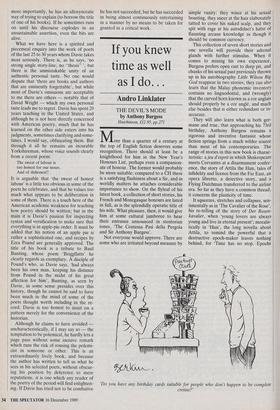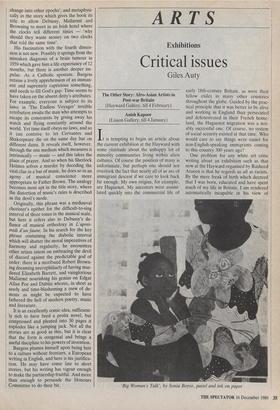If you knew
time as well as I do. • •
Andro Linklater
THE DEVIL'S MODE by Anthony Burgess
Hutchinson, £12.95, pp.2 71
More than a quarter of a century at the top of English fiction deserves some recognition. There should at least be a knighthood for him in the New Year's Honours List, perhaps even a companion- ate of honour. The former would probably be more suitable; compared to a CH there is a satisfying flashiness about a Sir, and in worldly matters he attaches considerable importance to show. On the flyleaf of his latest book, a collection of short stories, his French and Monegasque honours are listed in full, as is the splendidly operatic title of his wife. What pleasure, then, it would give him at some cultural jamboree to hear their entrance announced in stentorian tones, 'The Contessa Pasi della Pergola and Sir Anthony Burgess'.
Not everyone would approve. There are some who are irritated beyond measure by simple vanity: they wince at his sexual boasting, they sneer at the hair elaborately tatted to cover his naked scalp, and they spit with rage at his autodidact's habit of flaunting arcane knowledge as though it should be common currency. This collection of seven short stories and one novella will provide their adrenal glands with further stimulus. When it comes to mining his own experience, Burgess prefers open cast to deep pit, and chunks of his sexual past previously thrown up in his autobiography Little Wilson Big God reappear in two stories; they can also learn that the Malay phonemic inventory contains no linguodental, and (wrongly) that the curved horn known as a cor anglais should properly be a cor angle, and much else besides that is either redundant or in- accurate.
They will also learn what is both ger- mane and true, that approaching his 73rd birthday, Anthony Burgess remains a rigorous and inventive fantasist whose fiction springs from a much wilder source than most of his contemporaries. The range of stories in this new book is charac- teristic: a jeu d'esprit in which Shakespeare meets Cervantes at a disarmament confer- ence, the story of Attila the Hun, tales of infidelity and licence from the Far East, an opera libretto, a detective story, and a Flying Dutchman transferred to the airline era. So far as they have a common thread, it concerns the plasticity of time.
It squeezes, stretches and collapses, sen- timentally as in 'The Cavalier of the Rose', his re-telling of the story of Der Rosen- kavalier, when 'young lovers are always young and live in eternal present'; moralis- tically in 'Hun', the long novella about Attila, to remind the powerful that a destructive epoch-maker leaves nothing behind, for 'Time has no stop. Epochs `Do you have any birthday cards suitable for people who don't happen to be complete cretins?' change into other epochs'; and metaphysi- cally in the story which gives the book its title to allow Debussy, Mallarme and Browning to meet in an Irish hotel where the clocks tell different times — 'why should they waste money on two clocks that told the same time'.
His fascination with the fourth dimen- sion is not new. Possibly it springs from the mistaken diagnosis of a brain tumour in 1959 which gave him a life expectancy of 12 months, but there is another deeper im- pulse. As a Catholic apostate, Burgess retains a lively apprehension of an imman- ent and supremely capricious something, and needs to fill God's gap. Time seems to have taken on the absent deity's attributes. For example, everyone is subject to its laws: in 'The Endless Voyager' terrible retribution awaits the man who attempts to escape its constraints by giving away his watch and flying constantly around the world. Yet time itself obeys no laws, and so it can contrive to let Cervantes and Shakespeare die on the same day but on different dates. It reveals itself, however, through the one medium which measures it intrinsically — music — and this takes the place of prayer. And so when his Sherlock Holmes solves a murder by decoding the vital clue in a bar of music, he does so in an agony of musical conscience more appropriate to Father Brown. The analogy becomes most apt in the title story, where the distortion of music's rules is described as the devil's mode.
Originally, this phrase was a mediaeval chorister's epithet for the difficult-to-sing interval of three tones in the musical scale, but here it refers also to Debussy's de- fiance of musical orthodoxy in L'apres- midi faune. In his search for the key phrase containing the diabolic interval which will shatter the moral imperatives of harmony and regularity, he encounters other artists intent on embracing the devil of discord against the predictable god of order: there is a moribund Robert Brown- ing dreaming necrophiliacly of having mur- dered Elizabeth Barrett, and vainglorious MaIlarme nourishing his genius on Edgar Allan Poe and Dublin whores, in short as seedy and time-blasheming a crew of de- mons as might be expected to have fathered the hell of modern poetry, music and literature.
It is an excellently comic idea, sufficient- ly rich to have bred a prolix novel, but compressed and pleated into 30 pages it explodes like a jumping jack. Not all the stories are as good as this, but it is clear that the form is congenial and brings a useful discipline to his powers of invention.
Burgess plumes himself upon being heir to a culture without frontiers, a European writing in English, and here is his justifica- tion. He may have come late to short stories, but his writing has vigour enough to make the partnership fruitful. And more than enough to persuade the Honours Committee to do their bit.



















































 Previous page
Previous page